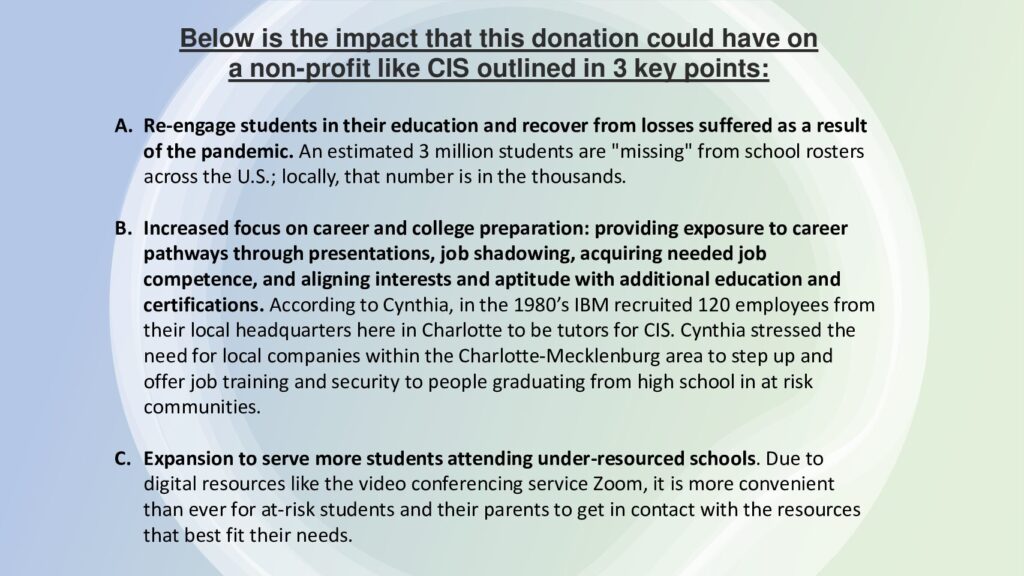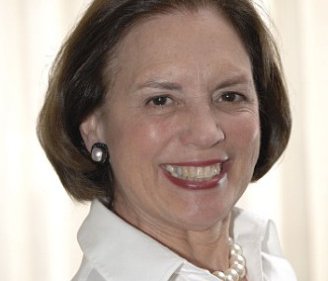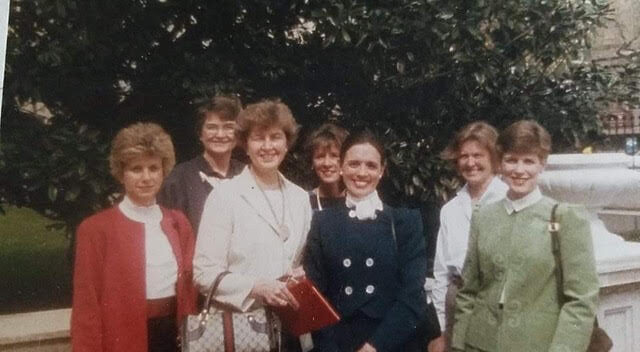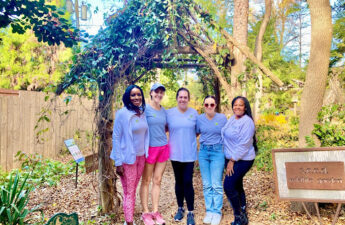On February 3, 2022 we were delighted to hear that the Charlotte-Mecklenburg chapter of the national non profit Communities in Schools (CIS) had received a monumental $5 million donation. We also found out that the gift, though amazing, was part of something even bigger. The funds came from philanthropist MacKenzie Scott, who donated a total of $133.5 million to individual chapters of CIS. This gift is part of over $8.5 billion that Ms. Scott has donated to non-profits since 2020. Keep reading to hear more about CIS and their ties to the Junior League of Charlotte.
Communities in Schools was founded by Bill Milliken in New York City in the 1970s. His aim was simple: bring community resources into public schools, making them more accessible to at-risk youth.
“It’s relationships, not programs, that change children. A great program simply creates the environment for healthy relationships to form between adults and children. Young people thrive when adults care about them on a one-to-one level, and when they also have a sense of belonging to a caring community.” – Bill Milliken, Founder and Vice Chairman of Communities In Schools, Inc.
In the 2020-2021 school year alone, CIS impacted the lives of approximately 1.61 million students, with 99% of those students remaining in school throughout the entire time period. Additionally, 93% of high school seniors taking part in CIS resources graduated or recieved a GED. CBS News was there to capture Bill’s reaction to receiving the announcement of the $133.5 million donation, an emotional moment for the man who has devoted his life to helping students find a brighter future. (video link)
In light of the news regarding Makenzie Scott’s big donation, we reached out to former Junior League of Charlotte (JLC) President Cynthia Marshall to get her thoughts on this monumental occasion.
Cynthia’s involvement with the JLC
In addition to being JLC President in 1984, Cynthia Marshall was the founding executive director of Communities In Schools of Charlotte/Mecklenburg County, NC, and served in that role for 21 years until her retirement in August 2006. Currently, she serves as a consultant for Communities In Schools of North Carolina on advancing service-learning in North Carolina schools (K-12).
During her time with the JLC she was also chair of the Sponsorship Recognition Committee, working with local Charlotte corporations to get them involved in JLC funded efforts. At one point, she helped spear-head a child advocacy committee called Family Matters with 12 high-ranking, community leaders including the Mayor, superintendent for Charlotte-Mecklenburg Schools and county commission chair. Pulling this off on a quarterly basis was no small feat in a pre-video conference world but the JLC made it happen. The benefit of coordinating all of those community leaders was that any time the JLC needed help, the right people were only a phone call away.
“We have the opportunities to remove barriers and make kids visible, because many of our children are invisible, even when school is in session.”
Cynthia & CIS
In 1976, Cynthia was one of two JLC members chosen to attend that year’s AJLI National Conference called “For Children’s Sake.” The conference featured a keynote from Dr. Urie Bronfenbrenner. Following the conference, a child advocacy committee was formed within the JLC to learn about where issues were residing within areas such as foster care, child abuse, healthcare, early screening and diagnosis of childhood issues. Getting involved in these issues ignited Cynthia’s ongoing commitment to the league and helping at-risk communities within Charlotte.
“It wasn’t kids who were broken, it was the communities.”
Cynthia, how would you describe being a member of the JLC?
“I look on the Junior League as an army of caring people who care about each other. Who are building communities and have the power to make that kind of difference for others who don’t.”
Cynthia hopes that the JLC can explore new opportunities to engage our youth in this very critical time in their lives. The generation of children who are students right now are facing unprecedented times that have disrupted not only their lives but the lives of everyone around them.
Bringing CIS to Charlotte
In September of 1984, CIS founder Bill Milliken was the keynote speaker on the needs of children and families at a JLC monthly membership meeting. The following year, JLC members Jan Stedman (JLC President, 1976-77), Claire Tate, Mary Boyce (Chair of Public Education), and Cynthia Marshall (JLC president at the time), were invited to participate in the Mecklenburg County Task Force in partnership with the long-standing JLC focus on the critical areas of child advocacy and public education.
In March 1985, the task force was part of the delegation of 100 women from throughout the U.S. invited to attend a White House Briefing on school dropouts. This included a reception at the home of the Vice President and Mrs. Barbara Bush, a Junior League member in Texas. The delegates were briefed about the many complex challenges and barriers young people face in trying to attend and stay in school. The work of CIS (then called Cities In Schools) was presented by Bill Milliken along with a visit to a local high school in DC where they learned about CIS’s mission.
As a result, the task force members recommended to the Mecklenburg County Task Force that the CIS model be implemented locally, thus beginning the road to bring CIS to Charlotte-Mecklenburg Schools (CMS).
The Impact of CIS on Charlotte
When CIS was implimented locally it raised awareness of how many students had fallen through the cracks within the Charlotte-Mecklenburg school system and provided a pathway for change. CIS is not a program, it is a broker of resources for schools. It promotes collaboration amongst people and non-profits within communities.
“It’s about bringing the community together one school at a time.”
The Impact of MacKenzie Scott’s Generosity
Due to the pandemic, children have never needed more support than they do now. We have lost track of so many students over the last two years. CMS cannot locate them and has asked CIS to help. Some teenage students have made the choice to drop out of school in order to help support their families financially. Cynthia stressed that a lot of those drop outs don’t understand that they will always be limited career-wise and financially without obtaining a highschool diploma.There are also new concerns regarding the mental health crisis in the US that has recently amplified since the beginning of the pandemic.
Cynthia hopes the gift will help reignite support in CIS and inspire new and innovative ways to support kids and communities.

How Did MacKenzie Scott Hear about CIS?
She has a research organization who called many CIS affiliates, or local chapters. These affiliates were contacted by a person who wished to remain anonymous and asked them to provide documentation about their business operations. Some time later, the affiliates were contacted and told that they would be receiving the donation from MacKenzie Scott but asked them to keep the donor and amount a secret from the public and even their board chair until an agreed upon date. The funding was unsolicited and unrestricted, meaning there were no conditions for use of the money.



